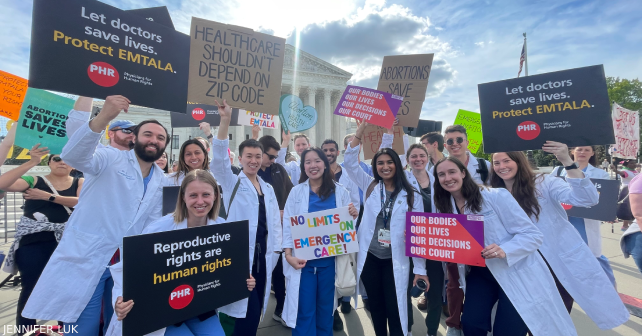
Both Idaho and South Carolina clearly state that “abortion” does not include action to remove a dead unborn child, which means that Ms. Thurman could have been treated there without hesitation. Georgia’s law is a bit different. Although the state’s definition of “abortion” similarly allows for miscarriage management, the specific language excludes “removing a dead unborn child caused by spontaneous abortion.” Ms. Thurman’s physicians may have known that she was facing complications of an induced abortion, not miscarriage from a spontaneous abortion, and been hesitant to provide lifesaving medical care for her because of how this law is worded.
Explore This Issue
ACEP Now: Vol 43 – No 12 – December 2024However, Georgia law defines abortion as an action with “purpose to terminate a pregnancy with knowledge that termination will cause the death of an unborn child.” By the time she presented to the emergency department, she was at least a few days post-ingestion of the abortion pill regimen. Treating her condition likely would not cause the death of her unborn child or even terminate her pregnancy. In addition, the Georgia law, like all U.S. state laws, clearly contains a “medical emergency” clause, requiring only that a physician determine, in reasonable medical judgment, that a medical emergency exists.
As physicians, we are responsible to advocate for our patients and their health. There is an obligation to understand the laws that directly affect our medical practice. The claim in the ACEP Now article that “pregnant people experiencing medical complications remain in a precarious position, as their doctors are kept in the dark about what the law requires,” indicates a lack of ownership over our medical practice on the part of physicians. This is shameful, and we physicians should hold ourselves accountable to be better prepared and educated in caring for our patients.
If your state’s laws are ambiguous or poorly worded, please get involved in improving them! Treatment of pregnant women with medical emergencies should not be falsely equated with the desire for expanding access to elective or induced abortion. This confusion of definitions is clearly contributing to preventable patient deaths. It is our responsibility as physicians to be leaders, providing accurate medical information and optimal treatment of our patients.
———————————————-
 Dr. Draper is an emergency medicine attending physician with Lowcountry Emergency Physicians in Charleston, S.C.
Dr. Draper is an emergency medicine attending physician with Lowcountry Emergency Physicians in Charleston, S.C.
Counterpoint: Collateral Damage of Restrictive Laws Continues To Be the Death and Injury of Pregnant Patients
By Karen Hou Chung, MD; Neha Gupta, MD; Breanne Jacobs, MD; Dara Kass, MD; and Kimi Chernoby, MD, JD
Pages: 1 2 3 4 5 | Single Page





3 Responses to “Point/Counterpoint: Abortion in the Emergency Department”
December 22, 2024
Todd B TaylorIn any contentious debate, it is important to hear from all sides, as the “truth” often lies in the middle. I wish to thank & congratulate Dr. Draper for her courage in bringing this perspective. In our current media-driven ideological “cancel-culture” society, contrarian voices are all too often left unheard.
In the rebuttal, Dr. Draper was called out by name 6 times in 7 paragraphs. While not particularly ad homonym, I will point out her arguments are reflective of the sentiments of many emergency physicians & the even the lay public who have had enough of political posturing.
In attempts to foster political ideology, the media & certain pro-abortion advocacy groups have foisted fantastical catastrophizing on the American public. There is no doubt this has caused many OB\GYN’s to take the most “conservative” (some might say “extreme”) approach in managing inevitable miscarriages.
While this rebuttal calls out a few examples (including in reference #1) of adverse outcomes, there is no doubt there are many more cases in which the usual standard of care in such states was followed, yet no physician has ever been accused, let alone prosecuted.
While this situation has certainly captured attention, there are other similar examples of controversies that have threatened the careers & livelihoods of physicians (albeit without the excessive media attention). In the early days of EMTALA, there were several examples of physicians trying to “do the right thing” that ran afoul of this federal statute, suffering career ending Medicare decertification & hundreds of thousands in fines. EMTALA also precipitated an on-call specialist availability crisis as thousands resigned or limited medical staff privileges. There were numerous hospitals that closed due to direct or indirect consequences of EMTALA. In time, however, advocacy, education, practice accommodation & case law resulted in something we can live with.
So, what I believe Dr. Draper is trying to say, let’s turn down the rhetoric & “right-fighting”, so we can move on to solutions that acknowledge reality & are ultimately best for patients.
December 23, 2024
John TannerFive versus one and you didn’t even give Dr. Draper a chance to respond? What’s up with that?
December 29, 2024
Mike DorrityHere’s a direct quote from the Texas Court opinion in State v. Zurawski the 5 authors cite but seem to ignore:
[2]Under the Human Life Protection Act, a woman with a life-threatening physical condition and her physician have the legal authority to proceed with an abortion to save the woman’s life or major bodily function, in the exercise of reasonable medical judgment and with the woman’s informed consent. As our Court recently held, the law does not require that a woman’s death be imminent or that she first suffer physical impairment. Rather, Texas law permits a physician to address the risk that a life-threatening condition poses before a woman suffers the consequences of that risk. A physician who tells a patient, “Your life is threatened by a complication that has arisen during your pregnancy, and you may die, or there is a serious risk you will suffer substantial physical impairment unless an abortion is performed,” and in the same breath states “but the law won’t allow me to provide an abortion in these circumstances” is simply wrong in that legal assessment.
As others have said on ACEP discussion boards, fear of prosecution is not the same as prosecution.